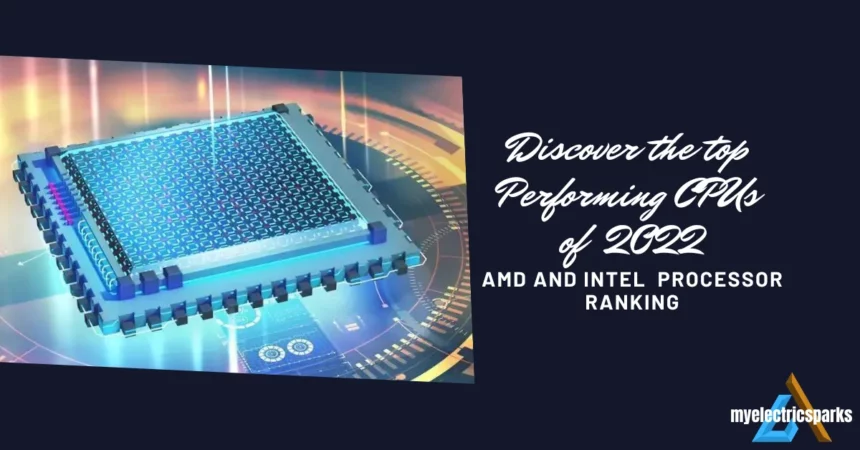Introduction: The Importance of CPU Performance
Your CPU is considered the most critical component in your computer and dramatically affects its overall performance. Sorting out the differences between different chips can be daunting, but the latest CPU benchmark hierarchy from toms hardware is here to help. The hierarchy ranks current and previous-generation Intel and AMD processors based on performance, including all of the best CPUs for gaming.
Re-Defining the Market: Intel’s Raptor Lake Chips
Intel has recently released the first Raptor Lake chips, which come from the Core i9-13900K, Core i7-13700K, and Core i5-13600K. These chips have upset AMD’s product stack and offer better value at every price point. Tom’s hardware has been busy re-testing the rest of their CPU benchmarks with the Nvidia GeForce RTX 4090, which they have found to change the hierarchy significantly.
AMD Takes the Stage: The Ryzen 7000 Processors
AMD has also released its Ryzen 7000 processors, including the Ryzen 9 7950X and Ryzen 5 7600X, which have been reviewed by toms hardware and added to the CPU benchmark rankings. In addition, the fire-breathing 64-core 128-thread Threadripper Pro 5995WX has also been added to the charts, providing surprisingly strong performance in gaming.
Ranking Methodology: Game Testing, Application Performance, and Integrated Graphics
The rankings are based on three categories: game testing, application performance, and integrated graphics CPU benchmarks. The game testing ranking is first, followed by single- and multi-threaded application performance measurements, and finally, the combined graphics CPU benchmark ranking.
Comparing Alder Lake and Ryzen 5000:The Latest CPU Showdown
In the latest rankings, the Alder Lake chips are compared to the Ryzen 5000 lineup in Windows 11, along with DDR4 vs. DDR5 benchmarks and CPU overclocking configurations. The results show the essential Ryzen and Intel SKUs in the first four charts, with an expanded list of chips in the additional four charts.
Latest Updates: Raptor Lake and Zen 4 Ryzen 7000 CPUs
The Raptor Lake and Zen 4 Ryzen 7000 CPUs have been recently added to the hierarchy, and toms hardware has tested the Ryzen 9 7950X and Ryzen 5 7600X with updated software and BIOS revisions. These results are not directly comparable with historical data, as they were tested with the Nvidia RTX 4090, while the older test suite used the 3090.
Gaming CPU Benchmarks Ranking 2023 – Windows 10
The table below compares various CPU models, their microarchitecture, cores/threads, base and boost clock speeds, TDP, and gaming scores at 1080p and 1440p resolutions. The ranking is based on their respective performance in gaming. The table includes models from Intel’s Alder Lake, Rocket Lake, Comet Lake, and Zen 3 architecture from AMD.
| Rank | CPU Model | Microarchitecture | Cores / Threads | Base GHz | Boost GHz | TDP (W) | 1080p Gaming Score | 1440p Gaming Score |
|---|---|---|---|---|---|---|---|---|
| 1 | Alder Lake Core i9-12900K | Alder Lake | 16 / 24 | 3.2 | 5.2 | 241 | 100% | 95.86% |
| 2 | Rocket Lake Core i9-11900K | Rocket Lake | 8 / 16 | 3.5 | 5.3 | 125 | 92.48% | 97.26% |
| 3 | Alder Lake Core i7-12700K | Alder Lake | 12 / 20 | 3.6 | 4.9 | 190 | 97.71% | 97.30% |
| 4 | Zen 3 Ryzen 9 5900X | Zen 3 | 12 / 24 | 3.7 | 4.8 | 105 | 90.98% | 93.18% |
| 5 | Zen 3 Ryzen 9 5950X | Zen 3 | 16 / 32 | 3.4 | 4.9 | 105 | 90.22% | 95.32% |
| 6 | Zen 3 Ryzen 5 5600X | Zen 3 | 6 / 12 | 3.7 | 4.6 | 65 | 88.51% | 91.79% |
| 7 | Zen 3 Ryzen 7 5800X | Zen 3 | 8 / 16 | 3.8 | 4.7 | 105 | 86.85% | 91.72% |
| 8 | Rocket Lake Core i7-11700K | Rocket Lake | 8 / 16 | 3.6 | 5.0 | 125 | 86.3% | 92.0% |
| 9 | Comet Lake Core i9-10900K | Comet Lake | 10 / 20 | 3.7 | 5.3 | 125 | 85.01% | 91.5% |
| 10 | Comet Lake Core i9-10850K | Comet Lake | 10 / 20 | 3.6 | 5.2 | 95 | 84.6% | 91.07% |
Note: The table is ranked based on the 1080p gaming score, and the other columns such as TDP, cores/threads, and base/boost GHz have also been included to give a better overview of the CPUs.
Tom’s Hardware Ranks CPU Processors for Gaming Performance
Tom’s Hardware has conducted comprehensive testing and ranking of all Intel 12th, 11th, 10th, 9th, 8th, and 7th Gen processors, along with AMD’s Ryzen and Threadripper chips from all four generations. These tests were conducted in Windows 10 for compatibility purposes, and the results have been divided into rankings based on 1080p and 1440p CPU gaming benchmarks.
1080p Game Results: The most powerful chip in the 1080p gaming benchmarks scored 100, and all other chips were ranked relative to it. The chart is based on the 1080p game results, and the top-ranked chips include the Alder Lake Core i9-12900K, Rocket Lake Core i9-11900K, Alder Lake Core i7-12700K, and Zen 3 Ryzen 9 5900X.
1440p Game Results: The 1440p listings have been ranked in sequential order due to table limitations. However, it is essential to note that some faster chips at 1440p CPU benchmarks may be listed below slower chips due to the 1080p results. The top-ranked chips in the 1440p gaming benchmarks include the Alder Lake Core i9-12900K, Rocket Lake Core i9-11900K, Alder Lake Core i7-12700K, and Zen 3 Ryzen 9 5950X.
Exceptions: There’s a notable exception in the charts: The Threadripper Pro 5995WX, 5975WX, and 3975WX have slightly higher performance if they exclude two game titles that don’t seem to respond well to their architecture (Borderlands 3 and Far Cry 5). Tom’s Hardware has included those results in this measure to ensure compatibility with the effects library, but the chips score higher with those titles excluded.
12th-Gen Intel Processors: The 12th-Gen Intel processors, like the 12900K, 12700K, and 12600K, have two measurements for each entry — that’s to quantify performance with both DDR4 and DDR5 memory. The tests showed that DDR4 memory almost always performs better in Windows 10.
Testing Methodology: Tom’s Hardware measured performance for the 1080p CPU gaming benchmarks with a geometric mean of Borderlands 3, Hitman 2, Far Cry 5, Project CARS 3, Red Dead Redemption 2, and Shadow of the Tomb Raider. Performance for the 1440p CPU gaming benchmarks was measured with a geometric mean of Borderlands 3, Project CARS 3, Far Cry 5, Red Dead Redemption 2, and Shadow of the Tomb Raider.
Tom’s Hardware has provided a comprehensive and up-to-date ranking of CPU processors based on gaming performance, making it easier for gamers to choose the correct chip for their needs. The rankings consider the raw version, compatibility with Windows 10, and the limitations of the tables.
INTEGRATED GPU GAMING CPU BENCHMARKS RANKINGS 2023
| Resolution | 1280×720 | 1920×1080 |
|---|---|---|
| Ryzen 7 5700G B550-E | 100% | 100% |
| AMD Ryzen 9 5950X | 95.6% | 96.2% |
| AMD Ryzen 9 5900X | 94.3% | 95.4% |
| Intel Core i9-11900K | 92.4% | 93.8% |
| Intel Core i9-11900 | 91.2% | 92.7% |
| AMD Ryzen 7 5800X | 89.5% | 91.1% |
| Intel Core i7-11700K | 86.9% | 88.2% |
| Intel Core i7-11700 | 85.7% | 87.1% |
| AMD Ryzen 5 5600X | 80.9% | 81.6% |
Note: The above table shows the CPU Performance Ranking 2022 of various integrated GPUs relative to the AMD Ryzen 7 5700G, based on gaming benchmarks in resolutions 1280×720 and 1920×1080. The performance is expressed as a percentage close to the Ryzen 7 5700G, with 100% equal performance.
SINGLE-THREADED CPU BENCHMARKS RANKINGS 2023
| Single-Threaded App Score | Architecture | Cores/Threads | Base/Boost GHz | TDP |
|---|---|---|---|---|
| 100% | AMD Ryzen 9 5950X | 16 / 32 | 3.4 / 4.9 | 105W |
| 99.57% (ABT off)<br>99.57% (ABT on) | Intel Core i9-11900K | 8 / 16 | 3.5 / 5.3 | 125W |
| 97.00% (DDR5)<br>96.48% (DDR4) | Core i9-12900K | 16 / 24 (8P+8E) | 3.2 / 5.2 | 125 / 241W |
| 96.29% | Intel Core i7-11700K | 8 / 16 | 3.6 / 5.0 | 95W |
| 96.69% | AMD Ryzen 9 5900X | 12 / 24 | 3.7 / 4.8 | 105W |
| 96.84% | AMD Ryzen 7 5800X | 8 / 16 | 3.8 / 4.7 | 105W |
| 96.56% (ABT off)<br>93.67% (ABT on) | Intel Core i5-11600K | 8 / 16 | 3.9 / 4.9 | 125W |
| 95.60% (DDR5) | Core i7-12700K | 12 / 20 (8P+4E) | 3.6 / 4.9 | 125W / 190W |
| 94.25% | AMD Threadripper Pro 5975WX | 64 / 128 | 2.7 / 4.5 | 280W |
| 94.19% | AMD Ryzen 5 5600X | 6 / 12 | 3.7 / 4.6 | 65W |
| 94.92% | Ryzen 7 5700G | 8 / 16 | 3.9 / 4.4 | 65W |
| 94.48% | AMD Threadripper Pro 5995WX | 64 / 128 | 3.6 / 4.5 | 280W |
| 93.85% (DDR4)<br>93.82% (DDR5) | Core i5-12600K | 10 / 16 (6P+4E) | 3.7 / 4.9 | 125 / 150W |
| 93.68% | Intel Core i9-10900K | 10 / 20 | 3.7 / 5.3 | 125W |
| 93.75% | AMD Ryzen 5 5600G | 6 / 12 | 3.9 / 4.4 | 65W |
| 93.87% | Intel Core i9-10850K | 10 / 20 | 3.6 / 5.2 | 95W |
| 92.13% | Intel Core i9-9900KS | 8 / 16 | 4.0 / 5.0 | 127W |
| 92.09% | Intel Core i5-11400 | 6 / 12 | 2.6 / 4.4 | 65W |
| 91.63% | Intel Core i9-9900K | 8 / 16 | 3.6 / 5.0 | 95W |
| 91.31% | Intel Core i7-10700K | 8 / 16 | 3.8 / 5.1 | 125W |
| 91.51% | AMD Ryzen 3 5300G | 8 4.0 | 4.2 |
Single-Threaded CPU Rankings Unveiled by Toms Hardware
Introduction:
Introduction:
- Latest Comparison of Market’s Top Chips
- Geometric Mean of Cinebench, POV-Ray, and LAME CPU Benchmarks
Test Environment:
- Windows 10 vs. Windows 11
- Impact on 12th-Gen Intel Chips
- Leading Chips in Windows 11:
- Alder Lake (Core i7-12900K, 12700K, and 12600K)
Single-Threaded Performance:
- Critical Factor in PC Responsiveness and Speed
- Dependency on IPC Throughput and Frequency
- Additional Factors Impacting Performance:
- Cache, Architecture, and Interconnects
Performance Variation:
- Based on Application and Optimization for Architecture
- Single-Threaded Performance Overview:
- Importance in Everyday PC Use
- Operating System Loading and Web Browsing
IPC Throughput and Frequency:
- Understanding the Mixture
- Importance in Single-Threaded Performance
Cache, Architecture, and Interconnects:
- Understanding Their Role in Performance
- Impact on Single-Threaded Performance
Performance Optimization:
- Importance of Application-Specific Optimization
- Key to Achieving Optimal Performance
Conclusion:
- Single-threaded performance is a crucial aspect of a PC’s overall performance.
- Windows 11 offers improved performance for specific chips, as compared to Windows 10
- The mixture of IPC throughput and frequency, along with cache, architecture, and interconnects, determine single-threaded performance.
- Performance varies based on application and optimization for the respective architecture.
Multi-Threaded CPU Benchmarks Rankings 2022
This table presents a comprehensive ranking of the top multi-threaded processors in the market in 2022. The rankings are based on the Multi-Threaded App Score and are sorted in descending order, with the highest scorer ranked first.
The table includes information on the processor’s architecture, number of cores and threads, base/boost frequency, and thermal design power (TDP). This information compares the processor’s overall performance and power consumption, which are crucial factors to consider when purchasing a processor.
| Multi-Threaded App Score | Architecture | Cores/Threads | Base/Boost GHz | TDP |
|---|---|---|---|---|
| 114.23% | Zen 4 | 64 / 128 | 2.8 / 4.6 | 280W |
| 110.00% | Zen 4 | 32 / 64 | 3.7 / 4.5 | 280W |
| 80.76% | Ice Lake | 18 / 36 | 3.5 / 4.5 | 150W |
| 76.90% | Zen 3 | 16 / 32 | 3.5 / 4.9 | 105W |
| 70.01% | Zen 3 | 12 / 24 | 3.8 / 4.8 | 105W |
| 68.12% | Zen 2 | 32 / 64 | 3.7 / 4.5 | 280W |
| 62.90% | Zen 2 | 16 / 32 | 3.6 / 4.7 | 105W |
| 56.78% | Alder Lake | 18 / 36 | 3.0 / 4.8 | 165W |
| 55.60% | Zen 2 | 24 / 48 | 3.8 / 4.5 | 280W |
| 55.09% DDR4 / 54.90% DDR5 | Alder Lake | 16 / 24 (8P+8E) | 3.3 / 5.3 | 125W / 241W |
| 52.21% | Zen 2 | 16 / 32 | 3.4 / 4.7 | 280W |
| 51.06% off/on 52.10% | Rocket Lake | 8 / 16 | 3.6 / 5.3 | 125W |
| 50.99% | Comet Lake | 10 / 20 | 3.8 / 5.3 | 125W |
| 50.67% | Zen 3 | 8 / 16 | 3.9 / 4.7 | 105W |
| 50.26% | Comet Lake | 10 / 20 | 3.7 / 5.2 | 95W |
| 49.78% | Rocket Lake | 8 / 16 | 3.7 / 5.0 | 125W |
| ~ Skylake | 18 / 36 | 4.4 / 4.5 | 165W | |
| ~ Zen+ | 32 / 64 | 3.0 / 4.2 | 250W | |
| 47.65% | Zen 2 | 12 / 24 | 3.9 / 4.6 | 105W |
| 47.62% | Zen 2 | 12 / 24 | 3.9 / 4.7 | 105W |
| 46.39% DDR5 / 46.11% DDR4 | Alder Lake | 12 / 20 (8P+4E) | 2.8 / 3.9 | 125W / 190W |
TOMS HARDWARE REVEALS MULTI-THREADED CPU BENCHMARK RANKINGS Performance of the Latest CPU Chips Compared
Toms Hardware has released its latest multi-threaded CPU benchmark rankings, comprehensively comparing the latest chips on the market. The results are based on the performance of the chips in various CPU benchmarks, including Cinebench, POV-ray, vray, Blender, y-cruncher, and Handbrake x264 and x265 workloads. These benchmarks represent the performance of the chips in productivity-focused applications that require more computing power.
Test Results on Windows 10 and 11
The tests were conducted on Windows 10 and 11, showing a significant performance difference between the two operating systems. Windows 10 penalizes the scores of the 12th-Gen Intel chips due to its lack of precision in targeting threads at the correct cores compared to Windows 11. The results of the tests on Windows 11, which can be seen in the album in the first article, reveal that Alder Lake chips, such as the Core i7-12900K, 12700K, and 12600K, perform much better on this operating system.
Factors Affecting Multi-Threaded Performance
The results of the multi-threaded performance tests vary based on various architectural factors such as core/thread count, architecture, caches, and interconnects. These factors affect how well performance scales with different threads and software, with performance rarely rising perfectly with adding more cores/threads. The scaling aspect of each processor architecture plays a significant role in determining the value proposition of going with a higher core count processor.
Conclusion
Multi-threaded performance is crucial in determining a chip’s performance in applications that utilize multiple software threads. The tests conducted by Toms Hardware provide valuable insights into the performance of the latest chips on the market. They can help users make informed decisions when purchasing a new processor.
How to Benchmark Your CPU: A Comprehensive Guide
Introduction: Benchmarking your CPU is a crucial step in determining the performance of your computer. Whether you’re overclocking your system or just making some tweaks, running a CPU benchmark before and after the changes can give you a clear picture of the impact of the modifications. This article will guide you through benchmarking your CPU, from selecting the best benchmarks to interpreting the results.
The Importance of Multi-Threaded Performance Metrics: A new study by Toms Hardware provides valuable insight into the multi-threaded performance of various CPU models. The tests were conducted using a combination of CPU benchmarks, including Cinebench, POV-ray, vray, Blender (four tests – Koro, Barcellona, Classroom, bmw27), y-cruncher, and Handbrake x264 and x265 workloads. These benchmarks represent performance in productivity-focused applications that require more computing power. The most powerful chip was scored 100, and all others were scored relative to it.
Windows 11 vs. Windows 10: It’s important to note that the Toms Hardware tests were conducted in Windows 10, which harmed the scores of the 12th-Gen Intel CPUs. This is because Windows 10 doesn’t target threads as accurately as Windows 11, which results in lower scores. You can find the results for the Windows 11 tests in the first album of the Toms Hardware article.
Factors Affecting Multi-Threaded Performance: Multi-threaded performance varies based on architectural elements, including core/thread count and the scalability of the software with additional cores. These results can also be influenced by the CPU’s architecture, caches, and interconnects. It’s crucial to keep in mind that performance only sometimes rises perfectly with the addition of more cores/threads, and the scaling factor of each processor architecture plays a significant role in the value proposition of choosing a higher core count processor.
Choosing the Best CPU Benchmarks: When choosing the best CPU benchmarks, the general rule is to measure the performance of the programs you use the most. If these programs don’t have built-in benchmarks, you can use similar programs (renderers or encoders) as a proxy for your workload. There are also several well-known benchmarks with large databases for easy comparisons, and you can use the standards from our library of reviews to gauge your system’s performance.
Gaming CPU Benchmarking: The same principles apply to gaming CPU benchmarking. The best CPU benchmark is the game you play the most. You can measure your performance during gameplay using an fps counter, such as FRAPS. Synthetic gaming CPU benchmarks can also provide insight into the raw computing power exposed to game engines, but they sometimes translate poorly to real-world gaming.
Web Browser Performance: It’s easy to overlook web browser performance, but it’s among the best CPU Performance Ranking 2022 to measure single-threaded workloads. This helps to quantify the snappiness of your system and is correlated with performance in games that prize single-threaded performance.
Tips for Accurate CPU Benchmark Results: To ensure accurate results compared to other gaming and application CPU benchmarks from reviews, forums, or friends, make sure to turn off as many background tasks as possible during your benchmarks.
List of CPU Benchmarks: For your convenience, we’ve compiled a list of some of the most common CPU benchmarks, complete with download links.
Best CPU Benchmarks You Can Run A Guide
I. Cinebench R23 (MS Store)
- A rendering CPU benchmark program with both single and multi-core modes
- One of the most widely used CPU benchmarks
II. UL Benchmarks 3DMark
- A synthetic CPU benchmark with various tests for CPUs and GPUs
- Regularly updated with new tests
- A popular choice for synthetic gaming tests
III. CPU-Z
- A standard utility that displays processor details
- Also has a built-in, easy-to-run CPU benchmark.
- Single and multi-thread results are not always representative of real-world tasks, but their stability makes them ideal for before and after comparisons.
- Test results are widely shared among enthusiasts for easy comparison.
IV. POV-Ray
- A rendering CPU benchmark with single and multi-threaded options
- Uses a heavier distribution of AVX instructions than Cinebench to create a challenging benchmark
V. C-Ray
- A CPU benchmark that uses a raytracer engine to measure multi-threaded floating-point operations
VI. HandBrake
- An encoder with many options, allowing you to tailor the encoding CPU benchmark to your needs
- Measure encoding time and use it as a baseline for comparison
VII. Corona
- A popular rendering utility and simple, one-click CPU benchmark
- Uses the Chaos Corona render engine to measure multi-threaded CPU performance
VIII. WebXPRT 4
- A click-to-run CPU benchmark that measures performance in HTML5, JavaScript, and WebAssembly-based tests
- An excellent choice for measuring single-threaded performance a heavy emphasis on neural network (machine learning) workloads
- Ideal for measuring single-threaded performance and keeping up with the increasing demand for machine-learning tasks.
X. Y-cruncher
- A CPU benchmark that runs from the command line and calculates Pi using AVX instructions in a heavily-threaded manner
- One of the best options for measuring SIMD performance
- Not user-friendly, but effective in stress testing and breaking overclocks.
CPU Benchmarks Test System and Configuration
| Hardware | Processor Family |
|---|---|
| AMD Socket AM4 (400- 500-Series) | AMD Ryzen 2000- 3000- 5000- series |
| MSI MEG X570 Godlike | |
| 2x 8GB Trident Z Royal DDR4-3600 | |
| Intel LGA 1151 (Z490) | Intel Comet Lake |
| MSI Z370 Gaming Pro Carbon AC | |
| 2x 8GB Trident Z Royal DDR4-3600 | |
| AMD Socket AM4 (300-Series) | Ryzen 1000-series |
| MSI X370 Xpower Gaming Titanium | |
| 2x 8GB G.Skill FlareX DDR4-3200 @ DDR4-2667 | |
| Intel LGA 1151 (Z270) | Intel Coffee Lake, Kaby Lake |
| MSI Z270 Gaming M7 | |
| 2x 8GB Trident Z Royal DDR4-3600 | |
| Intel LGA 2066 | Intel Skylake |
| MSI X299 Gaming Pro Carbon AC | |
| 2x 8GB Trident Z Royal DDR4-3600 | |
| Graphics Card | Gigabyte GeForce RTX 3090 Eagle |
| Storage | 2TB Intel DC4510 SSD |
| Power Supply | EVGA Supernova 1600 T2, 1600W |
| Operating System | Windows 10 Pro version 2004 (build 19041.450) |
| Cooling | Corsair H115i |
New Benchmark Results Show Significance of Upgrading Legacy Desktop CPUs
Legacy Desktop CPUs Performance Comparison
| Performance | Intel | AMD |
|---|---|---|
| Top-performing | Intel Core i9-7980XE | AMD Ryzen Threadripper 1950X |
| High-performance | Intel Core i9-7960X | AMD Ryzen Threadripper 1920X |
| Mid-range | Intel Core i7-8700K | AMD Ryzen 7 1800X |
| Budget | Intel Core i5-8400 | AMD Ryzen 5 1600X |
| Low-end | Intel Core i5-7600K | AMD Ryzen 3 1300X |
In a major development in the desktop computing industry, new benchmark results have been released, focusing on the performance of legacy desktop CPUs. The results encourage a balanced approach between the host processing power and complementary graphics processing units.
According to the findings, users with older platforms like Sandy Bridge-based Core i7 can expect a significant improvement in performance by upgrading to newer models like Coffee Lake or Kaby Lake. The results also revealed that putting AMD’s top FX CPUs next to the latest Core i7s and Core i5s could significantly upgrade the status of older systems.
The benchmark results are based on 13 total tiers, with the lower half of the chart consisting of outdated CPUs that are likely to drag down performance in modern games. The study suggests that upgrading to a higher-tier CPU would enhance the gaming experience for users who currently possess a CPU in that range.
The top five tiers of the chart are considered the most viable, with an upgrade typically being worthwhile if it is at least a couple of tiers higher. However, the study cautions that an upgrade would also require the expenses of a new CPU, motherboard, and RAM and a graphics card and storage solution.
In conclusion
The importance of CPU performance in a computer cannot be overstated. With the recent releases of Intel’s Raptor Lake chips and AMD’s Ryzen 7000 processors, the CPU benchmark hierarchy from toms hardware provides a valuable resource for sorting out the differences between various chips. The rankings are based on three categories: game testing, application performance, and integrated graphics CPU benchmarks.
With the latest updates, the Raptor Lake and Zen 4 Ryzen 7000 CPUs have been added to the hierarchy, comprehensively comparing the newest CPU models from both Intel and AMD. This article highlights the significance of these new releases and how they have impacted the CPU benchmark rankings. Overall, this article provides valuable information for anyone looking to upgrade their computer’s CPU and wants to understand the options available in the market.
Frequently Asked Questions:
- What are CPU benchmarks?
Answer: CPU benchmarks are tests evaluating a computer’s central processing unit (CPU) performance. They measure the speed and efficiency of the CPU in processing tasks and provide a score or ranking to compare it against other processors.
- Why are CPU benchmarks important?
Answer: CPU benchmarks are important because they objectively measure a processor’s performance, allowing consumers and businesses to make informed decisions when choosing a new computer or upgrading an existing one. They also help manufacturers compare their products against those of their competitors and improve future products.
- What factors do CPU benchmarks measure?
Answer: CPU benchmarks measure various factors, including the speed and efficiency of the CPU in processing tasks, the number of cores and threads, the clock speed, and the thermal design power (TDP).
- How are CPU benchmarks conducted?
Answer: CPU benchmarks are conducted by running a variety of tests that put the processor through its paces, measuring its performance in a range of tasks such as gaming, video rendering, data compression, and more. The results are then compared against other processors to provide a ranking or score.
- Who uses CPU benchmarks?
Answer: CPU benchmarks are used by many people, including consumers, businesses, computer enthusiasts, and manufacturers. Consumers use them to make informed decisions when buying a new computer or upgrading an existing one, while businesses use them to determine the best processor for their needs. Computer enthusiasts and manufacturers use them to compare their products against their competitors and to make improvements in future products.









